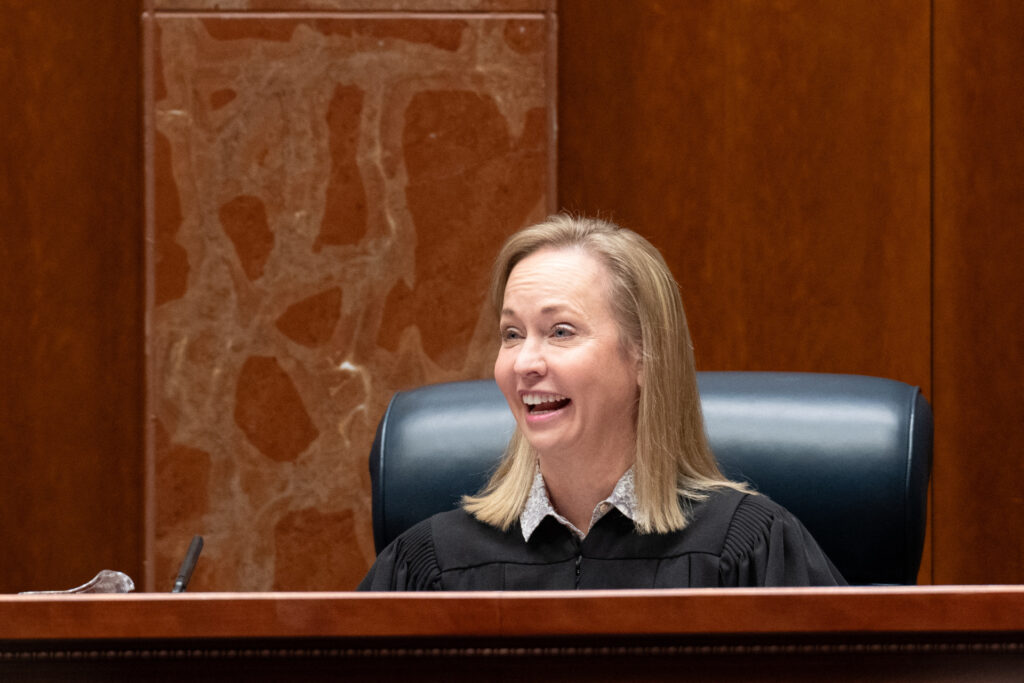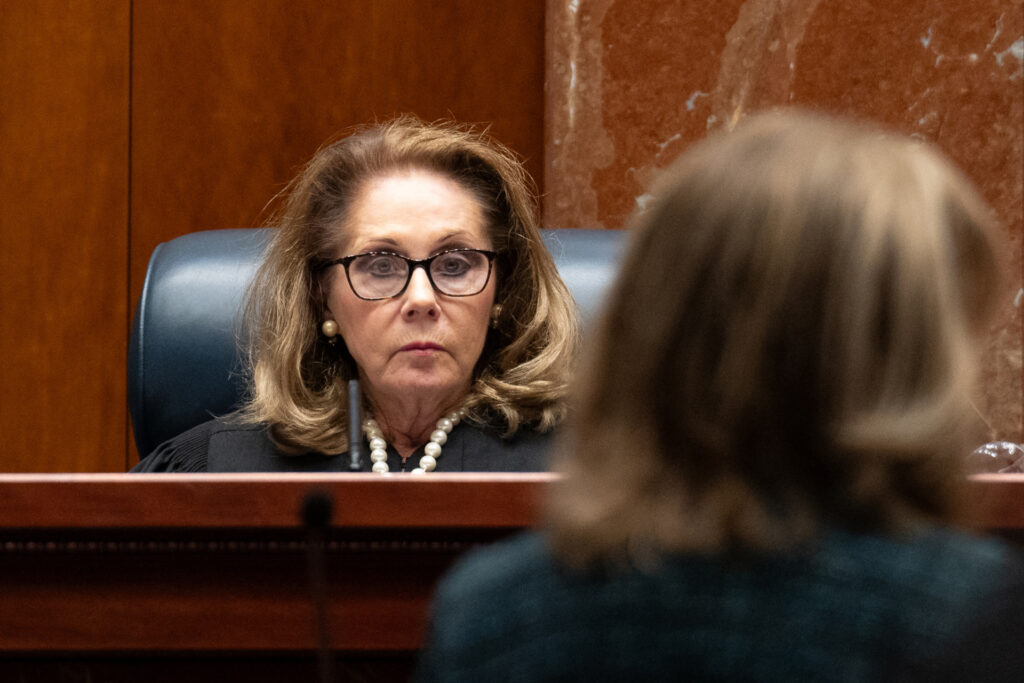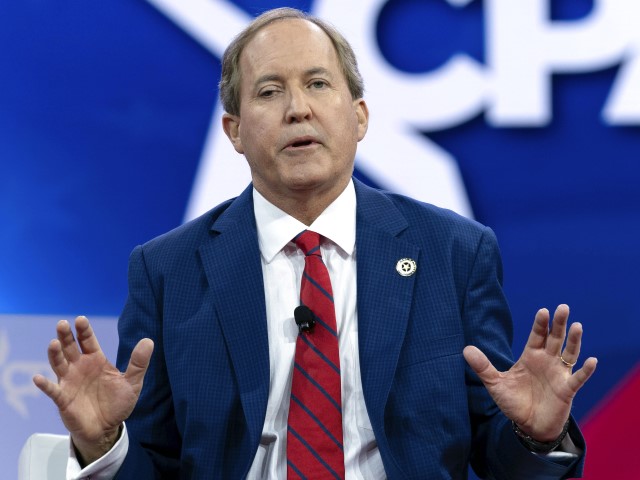The Texas Supreme Court on Friday rejected the claim that medical exceptions to the state’s abortion law are confusing, instead placing the onus on doctors to follow the law as written and on the state medical board to provide guidance.
The state’s high court unanimously reversed a lower court decision expanding the state’s narrow abortion exception in a case brought by the pro-abortion Center for Reproductive Rights on behalf of a few doctors and several women who experienced pregnancy complications but were denied abortions by doctors in the state. One of the women, Amanda Zurawski — whose story has been used by the Biden reelection campaign — testified that her doctors informed her of an inevitable miscarriage at 17 weeks of pregnancy but refused to perform an abortion because the baby’s heart was still beating. She ended up developing septic shock, was in intensive care for three days, and, ultimately, lost one of her fallopian tubes.

Amanda Zurawski speaks during a news conference held by members of the Pro-Choice Caucus and Democratic Women’s Caucus at the U.S. Capitol on March 7, 2024, in Washington, DC. (Kent Nishimura/Getty Images)
“This case comes to us as a direct appeal from a temporary injunction stopping enforcement of Texas’s abortion laws in various circumstances,” Justice Jane Bland wrote in the court opinion:
The plaintiffs include women who suffered serious complications during their pregnancies—situations filled with immense personal heartbreak. The State does not contest that at least some of these complications present life-threatening conditions for which an abortion may be indicated. In amendments to Texas law during the last regular legislative session, the Legislature expressly permitted abortion for one of the pregnancy complications presented in this case.
The Center for Reproductive Rights sued the State of Texas, Texas Attorney General Ken Paxton, and the Texas Medical Board, asking the court to block the state’s abortion laws because doctors allegedly declined to treat the women out of fear of legal consequences. In Texas, abortion is outlawed except when the mother is “at risk of death or poses a serious risk of substantial impairment of a major bodily function unless the abortion is performed or induced.” Under the law, doctors found guilty of performing illegal abortions in the state can face up to 99 years in prison, incur a $100,000 fine, and lose their medical license.
The state’s high court ultimately found that doctors did not prove the state’s Human Life Protection Act to be unconstitutional because it contains exceptions for the life of the mother and for serious injury. More specifically, Bland pointed out that the law “does not require a woman’s death to be imminent or that she first suffer physical impairment. Rather, Texas law permits a physician to address the risk that a life-threatening condition poses before a woman suffers the consequences of that risk.”

Justice Jane Bland of the Texas Supreme Court looks on as litigators make their arguments in Zurowski v. State of Texas at the Texas Supreme Court in Austin, Texas, on November 28, 2023. (SUZANNE CORDEIRO/AFP via Getty Images)
Bland continued:
A physician who tells a patient, “Your life is threatened by a complication that has arisen during your pregnancy, and you may die, or there is a serious risk you will suffer substantial physical impairment unless an abortion is performed,” and in the same breath states “but the law won’t allow me to provide an abortion in these circumstances” is simply wrong in that legal assessment.
In a concurring opinion, Justice Debra Lehrmann emphasized that “a physician need not wait until her patient is on the verge of death to perform either a life-saving abortion or one that would prevent serious physical impairment”:
Indeed, we reiterate that imminence is not required. We also make clear that one other physician’s opinion that the performing doctor used “reasonable medical judgment” is sufficient corroboration to support the performing doctor’s action. Hopefully, this will provide physicians with much-needed guidance about what the law requires.
Lehrmann continued, noting that “it bears reiterating that the immediate duty to articulate more detailed standards and best practices consistent with ‘reasonable medical judgment’ rests squarely on the medical community—not lawyers, judges, legislators, or anyone else lacking medical expertise.” The Texas Medical Board has been working on the proposed guidance, although the process has been met with much criticism.
She continued:
Physicians alone have the requisite education, training, and experience to articulate and exercise reasonable medical judgment in these life-and-death situations. Therefore, pursuant to our decision in this case, immediate and ongoing efforts to formulate applicable standards and best practices are essential to ensure that women in Texas receive the timely, quality medical care that they deserve and to which they are entitled.
“The further the medical community goes in undertaking this sensitive task now, the better-equipped courts will be to objectively evaluate a physician’s conduct in the future,” she wrote.

Justice Debra Lehrmann of the Texas Supreme Court looks on as litigators make their arguments in Zurowski v. State of Texas at the Texas Supreme Court in Austin, Texas, on November 28, 2023. (SUZANNE CORDEIRO/AFP via Getty Images)
The court also rejected the Center’s claims that the state does not have a rational interest in protecting unborn babies diagnosed with fetal abnormalities who are unlikely to live beyond hours or days of birth. Bland wrote:
The State responds that it has a legitimate, long-recognized interest in regulating abortion to protect unborn life. As painful as such circumstances are, that the law does not authorize abortions for diagnosed fetal conditions absent a life-threatening complication to the mother does not render it unconstitutional. Even before the Supreme Court overturned Roe v. Wade, courts recognized that legitimate interests support abortion regulation laws, including “preservation of prenatal life at all stages of development” and the “protection of maternal health and safety.” The balance the Legislature has struck is not assailable in court because a different balance arguably achieves these purposes.
Zurawski said in a statement on Friday that the ruling “feels like a gut punch.”
“Unfortunately, the Texas Supreme Court has showed us today that they don’t wish to help pregnant Texans access health care and they don’t want to help doctors practice medicine in the state of Texas,” she said. “The Supreme Court had the opportunity to provide clarity, but they didn’t – and we are right back where we started.”
Paxton conversely praised the court for upholding the state’s protections for unborn babies.
“[The] Supreme Court of Texas unanimously upheld the Human Life Protection Act, one of our state’s pro-life laws,” Paxton said. “I will continue to defend the laws enacted by the Legislature and uphold the values of the people of Texas by doing everything in my power to protect mothers and babies.”

Texas Attorney General Ken Paxton (Jose Luis Magana/AP)
Leading pro-life organization Susan B. Anthony (SBA) Pro-Life America also issued a statement in response to the ruling and blamed Democrats for sowing confusion and causing doctors to be fearful of performing abortions that fall under legal exceptions.
SBA Pro-Life America President Marjorie Dannenfelser said:
We know doctors by-and-large understand they can rely on their reasonable medical judgment based on data showing abortions under the state’s ‘life of the mother’ exception have continued post-Dobbs; and we are grateful the Texas Medical Board is taking steps to educate doctors and the public. What happened to Amanda Zurawski was completely wrong. No woman should suffer and almost lose her life when the law is clear that doctors can—and should—intervene to prevent further harm. Doctors and hospitals that refuse to provide women with lifesaving treatment are not abiding by their Hippocratic oath and they should be held accountable.
Joe Biden and Kamala Harris are putting lives in danger by spreading misinformation on pregnant women’s ability to receive emergency care. The abortion lobby has created confusion on this fact to give the Democrats cover for their extremely unpopular all-trimester abortion agenda. Despite this very clear decision from the Texas Supreme Court, Biden and Harris will continue to capitalize on tragedy and spread lies at the expense of women’s lives.
The case is Texas v. Zurawski, No. 23-0629 in the Supreme Court of Texas.
Katherine Hamilton is a political reporter for Breitbart News. You can follow her on X @thekat_hamilton.

COMMENTS
Please let us know if you're having issues with commenting.